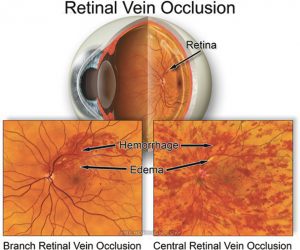Dr. Katia Taba, Board-Certified Ophthalmologist and Retinal Specialist
 Arteries and veins carry blood throughout your body, including your eyes. The eye’s retina has one main artery and one main vein. When the main retinal vein becomes blocked, it is called central retinal vein occlusion (CRVO).
Arteries and veins carry blood throughout your body, including your eyes. The eye’s retina has one main artery and one main vein. When the main retinal vein becomes blocked, it is called central retinal vein occlusion (CRVO).
When the vein is blocked, blood and fluid spills out into the retina. The macula can swell from this fluid, affecting your central vision. Eventually, without blood circulation, nerve cells in the eye can die and you can lose more vision.
What are symptoms of CRVO?
The most common symptom of CRVO is vision loss or blurry vision in part or all of one eye. It can happen suddenly or become worse over several hours or days. Sometimes, you can lose all vision suddenly.
You may notice floaters. These are dark spots, lines or squiggles in your vision. These are shadows from tiny clumps of blood leaking into the vitreous from retinal vessels.
In some more severe cases of CRVO, you may feel pain and pressure in the affected eye.
Who is at risk for CRVO?
CRVO usually happens in people who are aged 50 and older.
People who have the following health problems have a greater risk of CRVO:
• high blood pressure
• diabetes
• glaucoma
• hardening of the arteries (called arteriosclerosis)
To lower your risk for CRVO, you should do the following:
• eat a low-fat diet
• get regular exercise
• maintain an ideal weight
• don’t smoke
What causes CRVO?
CRVO happens when a blood clot blocks the flow of blood through the retina’s main vein. Disease can make the walls of your arteries more narrow, which can lead to CRVO. Disease can stiffen the walls of your arteries, which in turn compress the main vein and lead to CRVO.
Central Retinal Vein Occlusion (CRVO)
Diagnosis and Treatment
Your ophthalmologist will widen (dilate) your pupils with eye drops and check your retina. They will also do a scan of the retina called OCT to look for retinal swelling, which causes vision to decrease.
They may do a test called fluorescein angiography. Yellow dye (called fluorescein) is injected into a vein, usually in your arm. The dye travels through your blood vessels. A special camera takes photos of your retina as the dye travels throughout the vessels. This test shows if the retinal vein is blocked.
People under the age of 40 with central retinal vein occlusion (CRVO) may be tested to look for a problem with their blood clotting or thickening.
How is CRVO treated?
The main goal of treatment is to keep your vision stable. This is usually done by sealing off any leaking blood vessels in the retina. This helps prevent further swelling of the macula.
Your ophthalmologist may treat your CRVO with medication injections in the eye called “anti-VEGF injections.” The medicine can help reduce the swelling of the macula. Sometimes steroid medicine may be injected in the eye to help treat the swelling.
If your CRVO is very severe and new abnormal blood vessels are growing in your eye, your ophthalmologist may do a form of laser surgery. This is called panretinal photocoagulation (PRP). A laser is used to make tiny burns to areas of the retina. This helps lower the chance of bleeding in the eye and keeps eye pressure from rising too much.
It usually takes a few months after treatment before you notice your vision improving. While most people see some improvement in their vision, some people won’t have any improvement.
Personalized Retina Care of Naples
If you are experiencing any changes in your eye health, whether it is blurry vision, pain, impaired vision, or any other visual irregularities, you should see an ophthalmologist right away. The earlier a disease is detected, the better the outcome and treatment options are for you. You will find a friendly and warm environment at Personalized Retina Care of Naples.
Please call (239) 325-3970 today to schedule your eye exam. When necessary same day appointments can often be accommodated.
Personalized Retina Care of Naples provides comprehensive diagnosis and treatment for retinal disorders. Dr. Taba also gives second opinions on retinal and general eye conditions. Dr. Taba is a Board-Certified Ophthalmologist and is Fellowship trained in surgical and medical retinal diseases.
Personalized Retina Care of Naples
www.retinanaples.com | 239-325-3970
3467 Pine Ridge Rd., Suite 103, Naples 34109
References:
https://www.aao.org/eye-health/diseases/what-is-central-retinal-vein-
occlusion
https://www.aao.org/eye-health/diseases/central-retinal-vein-occlusion-
diagnosis









